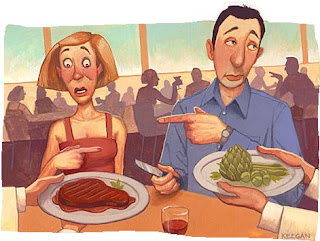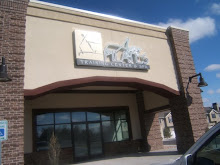Tuesday, February 1, 2011
Proteins
What Is Protein?
Protein is found throughout the body—in muscle, bone, skin, hair, and virtually every other body part or tissue. It makes up the enzymes that power many chemical reactions and the hemoglobin that carries oxygen in your blood. At least 10,000 different proteins make you what you are and keep you that way.
Twenty or so basic building blocks, called amino acids, provide the raw material for all proteins. Following genetic instructions, the body strings together amino acids. Because the body doesn't store amino acids, as it does fats or carbohydrates, it needs a daily supply of amino acids to make new protein.
The Protein Package
So when choosing protein-rich foods, pay attention to what comes along with the protein. Vegetable sources of protein, such as beans, nuts, and whole grains, are excellent choices, and they offer healthy fiber, vitamins and minerals. The best animal protein choices are fish and poultry. If you are partial to red meat, stick with the leanest cuts, choose moderate portion sizes, and make it only an occasional part of your diet.
No one knows the long-term effects of eating high-protein diets with little or no carbohydrates. Equally worrisome is the inclusion of unhealthy fats in some of these diets. There's no need to go overboard on protein and eat it to the exclusion of everything else. Avoiding fruits and whole grains means missing out on healthful fiber, vitamins, minerals, and other phytonutrients. It's also important to pay attention to what accompanies protein. Choosing plant-based high-protein foods that are low in saturated fat will help the heart even as it helps the waistline.
5 Quick Tips
Choosing Healthy Protein Foods
 1. Mix it up. Most reasonable diets provide enough protein for healthy people. Eating a variety of foods will ensure that you get all of the amino acids you need.
1. Mix it up. Most reasonable diets provide enough protein for healthy people. Eating a variety of foods will ensure that you get all of the amino acids you need. 2. Go low on saturated fat. Beans, fish and poultry provide plenty of protein, without much saturated fat. Steer clear of fatty meats and use whole-milk dairy products sparingly.
3. Limit red meat—and avoid processed meat. Research suggests that people who eat more than 18 ounces a week of red meat have a higher risk of colon cancer. So make red meat—beef, pork, lamb—only an occasional part of your diet, if you eat it at all. And skip the processed stuff—bacon, hot dogs, and deli meats—since that's also been linked to higher cancer risk.
4. Eat soy in moderation. Tofu and other soy foods are an excellent red meat alternative. But don't go overboard; 2 to 4 servings a week is a good target. And stay away from supplements that contain concentrated soy protein or extracts, such as isoflavones, as we just don't know the long term effects.
5. Balance carbs and protein. Cutting back on highly processed carbohydrates and increasing protein improves levels of blood triglycerides and HDL, and so may reduce your chances of having a heart attack, stroke, or other form of cardiovascular disease. It may also make you feel full longer, and stave off hunger pangs.
Source: Harvard School of Public Health
Subscribe to:
Post Comments (Atom)

Aspire Pilates Training Center & Spa
2464 W. 12600 S. Suite 190
Riverton, Utah 84065
801-302-5720
www.aspireptc.com
About Me
Blog Archive
-
▼
2011
(42)
-
▼
February
(34)
- 8 Ways to Stick to Your Diet While Friends Indulge
- Keep Your Joints Healthy
- Almond Crunch Arbonne Protein Shake
- Importance of Sleep
- Vitamin C
- Crispy Nut Butter Treats
- Sweeteners
- Water
- Dietary fiber: Essential for a healthy diet
- Piña Colada Arbonne Protein Shake
- Aerobic exercise: How to warm up and cool down
- Minerals
- Gluten Free & Vegan Peppermint Patties
- Face the Fats
- Finishing up Week 2 of the 28 Day Challenge....
- Happy Valentine's!
- What is YOUR Goal? ...
- Digestive Enzymes
- Nutty Apple Cinnamon Arbonne Protein Shake
- Relaxation
- Stress
- B Vitamins
- Arbonne Protein Powder Pancakes
- Good Carbs vs Bad Carbs
- First Week of 28 Day Challenge....
- Detoxification
- Probiotics
- Pumpkin Spice Protein Shake
- Cardio vs Strength Training
- Vitamin D
- Perfect Form
- Arbonne Protein Bars Recipe
- Monster Lo-Carb Energy Drink Vs Arbonne Fizz-tabs ...
- Proteins
-
▼
February
(34)
Followers
Powered by Blogger.



0 comments:
Post a Comment